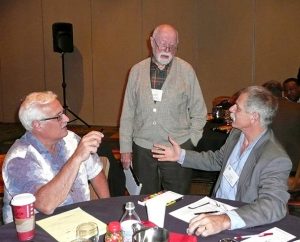By Megan K. Mertz
SAN ANTONIO — The Synod held its first LCMS Mission Summit Nov. 21-22 here, in conjunction with Lutheran Church Extension Fund’s Fall Leadership Conference. The summit — sponsored by the Office of the LCMS President, the LCMS Office of National Mission and the LCMS Office of International Mission — had “Together in God’s Mission” as its theme.

The summit included five presentations on the history and theology of Lutheran missions, the result of that mission work and a look forward to the future of such work on both the national and international fields. It also included a panel discussion, during which members of the audience were able to ask questions of all of the speakers.
The first presentation was given by the Rev. Dr. Walter Sundberg, professor of Church History at Luther Seminary, a seminary of the Evangelical Lutheran Church in America in St. Paul, Minn. Sundberg examined the history of Protestantism in America, begining with the arrival of the Puritans in the 1600s. He noted that even the Puritans struggled with “the problem of inactive membership,” an issue that the church continues to face today.
Sundberg encouraged participants “to heed the warning by going back to the works we did at first as a church, that is to Luther’s theology … to get us thinking in terms of our own tradition of mission.”
Next, the Rev. Dr. Albert B. Collver III, director of Church Relations for the LCMS, spoke on “Ecclesiology, Mission and Partner Relations.” He described the maturation process that takes place as a mission plant develops into a mature partner church that is able to sustain itself, raise up its own leaders and administer its own affairs.
“The formation of a new partner church does not mean the end of the connection between it and the Lutheran church that originally sent the missionaries. Rather, it begins a new phase where each church encourages, helps and supports the other to remain a responsible Lutheran church,” Collver said. “The relationship is mutual. Each church assists the other as it is requested and as it is able.”
The Rev. Dr. Charles Arand, professor of Systematic Theology at Concordia Seminary, St. Louis, then spoke on how the faith is delivered, focusing on the role of Luther’s Small Catechism in forming Christians. He mentioned that Luther wrote the book in memorable language to teach the faith and instruct on how to “properly use the gifts of God.”
“There’s one thing that has defined, I think, for Lutherans how we think, how we live. It’s the Small Catechism — it provides the grammar, the language, the thought patterns and the piety,” Arand said. “It’s both for me a handbook of the Christian life, but also a theological model for missions.”
The next day, the Rev. Dr. Klaus Detlev Schulz, professor of Pastoral Ministry and Missions at Concordia Theological Seminary, Fort Wayne, Ind., spoke on the Lutheran identity of missions throughout the church’s history.
“LCMS mission has the unique tradition that fuses church confession and missions, and with that tradition it may confidently address the world today,” Schulz said.
“The answer for LCMS mission lies in its ability to critically and constructively engage in a missiological conversation with the challenges and context of our time and respond to them fittingly and appropriately,” he continued.
LCMS President Rev. Dr. Matthew C. Harrison delivered the final presentation on “A Theological Statement for Mission in the 21st Century,” a document mandated by Res. 1-03A of the 2013 Synod convention. The document sets forth a description of the theology for Witness, Mercy, Life Together as the church’s mission.
“I’m all for going to places that have rough edges,” Harrison said, speaking of the Synod’s mission work around the world. “But from the beginning, the goal needs to be planting Lutheran churches.”
“We know by the Scriptures that God wants orthodox Lutherans … people who believe the Scriptures. And to be an orthodox Lutheran is just simply to be a Christian in the best sense of the term,” he continued.
Following Harrison’s presentation, members of the audience had time to ask questions of Harrison and other Mission Summit speakers.
“We hope the conference will be the first of an annual event and that we can expand the group to really have conversation and dialogue around the theology of mission,” said the Rev. Bart Day, executive director of the LCMS Office of National Mission. “Hopefully, this will be the start of a lot more conversation around the topic.”
Day indicated that all of the papers presented at the summit will be available for free download at a later date.
Megan K. Mertz is a staff writer with LCMS Communications.





Is/will these presentations be available for download or online?
Rev. Bart Day has indicated that all of the papers presented at the summit will be available for free download at a later date.